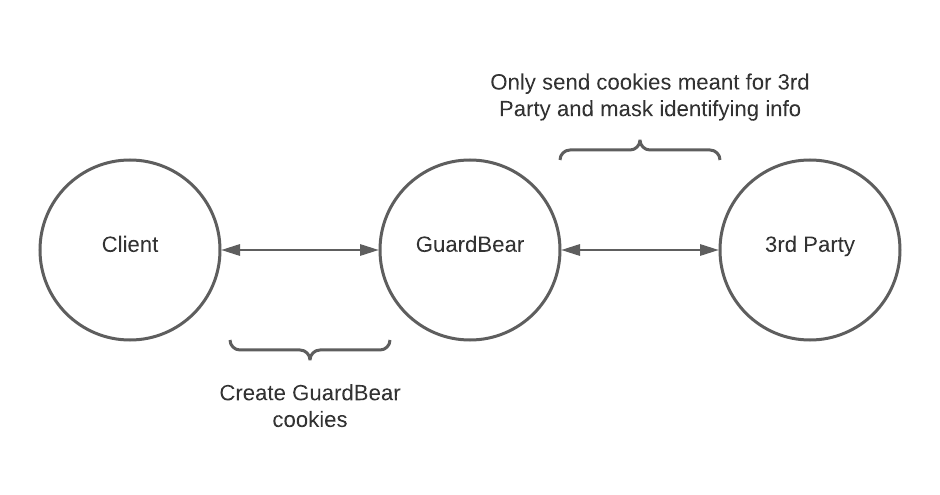GuardBear helps with browser restrictions (ITP / Safari, ETP / FireFox, Chrome dropping 3rd party cookies, etc) while still offering privacy & security protection to the end user. GuardBear is a safer solution compared to cname cloaking.
This open source project is currently a Proof-Of-Concept (POC). Please show your interest by starring the project, trying it out or starting a discussion!
If you don't have a GitHub account and want to talk, please connect with me on LinkedIn (please mention your interest in GuardBear when you connect) or email me - guardbear@silevitch.com
I'm more than happy to discuss with you the risks of cname cloaking or help you try out GuardBear.
If you manage a website or are a web based vendor, then you have struggled with the privacy restrictions imposed by the browsers (ITP / Safari, ETP / FireFox, Chrome dropping 3rd party cookies, etc). Cname cloaking is becoming a popular work around to try. According to the academic paper called "The CNAME of the Game:Large-scale Analysis of DNS-based TrackingEvasion", cname cloaking has the following potential risks:
- Transport Security (Section 6.1)
- Session Fixation (Section 6.2.1)
- Cross-Site Scripting (Section 6.2.2)
- Information Leakage (Section 6.3)
- Cookie Leaks (Section 6.4)
To avoid these security & privacy risks, the authors introduce the idea of using a reverse proxy instead of cname cloaking (Section 7). GuardBear is an open source project that implements this idea.
GuardBear is a reverse proxy that will take traffic destined for a 3rd party and do the following:
- Only send cookies meant for that 3rd party
- Mask identifying information (gdpr, ccpa, etc) - Currently, client ip address and referring url
You will create a cname that is named 3rdparty.guardbear.example.com that points to a GuardBear proxy that will forward traffic to 3rdparty.com. On example.com, you will change the references to 3rdparty.com to 3rdparty.guardbear.example.com.
When GuardBear sees a cookie being set from 3rdparty.com, it will change it's domain to 3rdparty.guardbear.example.com along with making a second cookie that is prefixed with "guardbear_". These new cookies tell GuardBear which cookies belong to the 3rd party.
To try out the POC in the repository, you will first need to install:
- Docker
- Docker-Compose
Then running "sudo docker-compose up" will install a GuardBear container along with an example 3rd party origin container. Both are based on openresty.
Any requests to "http://localhost:8080/echo_headers" will go through GuardBear before being forwarded to a webserver. The webserver will output the headers that it received. This will allow you to test different scenarios.
To run the test suite, you will need to install:
- Perl
- Test::WWW::Mechanize perl package (using cpan)
$ perl t/01.base_cases.pl
1..16
# Make a request with a cookie that is not flagged to be sent to the origin and make sure it is not sent
ok 1 - GET http://localhost:8080/echo_headers
ok 2 - Content lacks "Cookie: foobar=1"
# Make a request with a cookie that is flagged to be sent to the origin and make sure it is sent
ok 3 - GET http://localhost:8080/echo_headers
ok 4 - Content contains "Cookie: foobar=1"
ok 5 - GET http://localhost:8080/echo_headers
ok 6 - Cookie Test1 get domain rewritten
ok 7 - Cookie flag guardbear_Test1 is set
ok 8 - Cookie Test2 get domain rewritten
ok 9 - Cookie flag guardbear_Test2 is set
# This will make sure that we are masking client IPs sent in X-Forwarded-For header sent to the origin
ok 10 - GET http://localhost:8080/echo_headers
ok 11 - Content contains "X-Forwarded-For: 0.0."
# Let us pass in a XFF
ok 12 - GET http://localhost:8080/echo_headers
ok 13 - Content contains "X-Forwarded-For: 1.2.2.2, 0.0."
# This will make sure that we are scrubbing Referer headers that are sent to the origin
ok 14 - GET http://localhost:8080/echo_headers
ok 15 - Content contains "Referer: https://www.google.com/"
ok 16 - Content lacks "Referer: https://www.google.com/a/b/c/d"
You can support GuardBear in the following ways:
- Try it out!
- Star the project!
- Start a discussion!
- Leave feature requests or file bugs!
If there is community interest, the following will be added next:
- Instructions for running in production
- Multi-domain support
- Script that will build proxy_default.conf based on variables
- Let's Encrypt support
- End point to extend javascript created cookies
- K8s support
- ipv6 support for anonymizing ip
- Anonymize user-agents
- Academic article that discusses cname cloaking risks - https://arxiv.org/abs/2102.09301
- Blog post that dicusses ITP and mentions reverse proxy as a possible solution - https://www.simoahava.com/analytics/itp-2-1-and-web-analytics/
